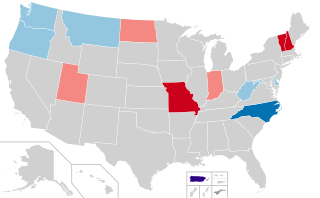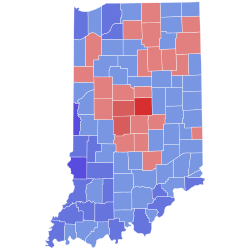
Frank Lewis O'Bannon was an American politician who served as the 47th governor of Indiana from 1997 until his death in 2003. He is the most recent U.S. Governor to have died in office.

Julia May Carson was a member of the United States House of Representatives for Indiana's 7th congressional district from 1997 until her death in 2007. Carson was the first woman and first African American to represent Indianapolis in the U.S. Congress. She was also the second African American woman elected to Congress from Indiana, after Katie Hall, and her grandson André Carson succeeded to her seat following her death.

Birch Evans Bayh Jr. was an American Democratic Party politician who served as U.S. Senator from Indiana from 1963 to 1981. He was first elected to office in 1954, when he won election to the Indiana House of Representatives; in 1958, he was elected Speaker, the youngest person to hold that office in the state's history. In 1962, he ran for the U.S. Senate, narrowly defeating incumbent Republican Homer E. Capehart. Shortly after entering the Senate, he became Chairman of the Subcommittee on Constitutional Amendments, and in that role authored two constitutional amendments: the Twenty-fifth—which establishes procedures for an orderly transition of power in the case of the death, disability, or resignation of the President of the United States—and the Twenty-sixth, which lowered the voting age to 18 throughout the United States. He is the first person since James Madison and only non–Founding Father to have authored more than one constitutional amendment. Bayh also led unsuccessful efforts to ratify the Equal Rights Amendment and eliminate the Electoral College.

United States gubernatorial elections were held on November 2, 2004, in 11 states and two territories. There was no net gain in seats for either party, as Democrats picked up an open seat in Montana while defeating incumbent Craig Benson in New Hampshire, while Republicans defeated incumbent Joe Kernan in Indiana and won Missouri after Bob Holden lost in the primary. These elections coincided with the presidential election.

Roger Douglas Branigin was an American politician who was the 42nd governor of Indiana, serving from January 11, 1965, to January 13, 1969. A World War II veteran and well-known public speaker, Branigin took office with a Democratic general assembly, the first time since the Great Depression that Democrats controlled both the executive and legislative branches of the Indiana state government. Branigin was a conservative Democrat who oversaw repeal of the state's personal property taxes on household goods, increased access to higher education, and began construction of Indiana's deep-water port at Burns Harbor on Lake Michigan. During his one term as governor, Branigin exercised his veto power one hundred times, a record number for a single term. Branigin was the last Democrat to serve as governor of Indiana until Evan Bayh took office in 1989.

The 2004 United States presidential election in Indiana took place on November 2, 2004, and was part of the 2004 United States presidential election. Voters chose 11 representatives, or electors to the Electoral College, who voted for president and vice president.

The Democratic Party of Indiana is the affiliate of the Democratic Party in the U.S. state of Indiana.
Indiana has long been considered to be a Republican stronghold and is rated R+11 on the Cook Partisan Voting Index. The current governor of Indiana is Republican Eric Holcomb, and Republicans hold supermajorities in both chambers of the Indiana General Assembly. It has only supported a Democrat for president four times since 1912 - in the elections of 1932, 1936, 1964, and 2008. Historically, the state was a swing state, voting for the national winner all but four times from 1816 to 1912, with the exceptions of 1824, 1836, 1848, and 1876.

John Richard Gregg is an American politician, businessman and attorney who served as the 85th and longest-serving Democratic speaker of the Indiana House of Representatives from 1996 to 2003. He served in the Indiana House of Representatives from 1987 to 2003.

Elections were held in Indiana on Tuesday, November 2, 2010. Primary elections were held on May 4, 2010.

John Massie Mutz is an American business leader and politician who served as Lieutenant Governor of Indiana, Republican candidate for Governor and president of Lilly Endowment, one of America's largest family foundations.

Joseph Hadden Hogsett is an American attorney, prosecutor, and politician who is the 49th mayor of Indianapolis, Indiana. Prior to being elected, Hogsett served as the Secretary of State of Indiana from 1989 to 1994 and as the Chairman of the Indiana Democratic Party from 2003 to 2004. He was the Democratic nominee for the U.S. Senate in 1992, for Indiana's 2nd congressional district in 1994 and for Attorney General of Indiana in 2004. He most recently served as the United States attorney for the Southern District of Indiana from 2010 to 2014. On November 3, 2015, he won the race for Mayor of Indianapolis in the 2015 election. He won reelection to a second term in 2019.

United States gubernatorial elections were held on November 8, 2016, in 12 states and two territories. The last regular gubernatorial elections for nine of the 12 states took place in 2012. The last gubernatorial elections for New Hampshire, Oregon, and Vermont took place in 2014, as Oregon held a special election due to the resignation of Governor John Kitzhaber, while the governors of New Hampshire and Vermont both serve two-year terms. The 2016 gubernatorial elections took place concurrently with several other federal, state, and local elections, including the presidential election, Senate, and House elections.

The 2016 United States Senate election in Indiana was held on November 8, 2016, to elect a member of the United States Senate to represent the State of Indiana. The election was held alongside the presidential election and 2016 Indiana elections.

The 1996 Indiana gubernatorial Election was held on November 5, 1996, alongside the election of both houses of the Indiana General Assembly. Incumbent Governor Evan Bayh, a Democrat, was ineligible to run for a third consecutive term due to term limits established by the Indiana Constitution. He was succeeded by Lt. Governor Frank O'Bannon, who won election over Republican Stephen Goldsmith with 52% of the vote.

The 1992 Indiana gubernatorial election was held on November 3, 1992. Incumbent Governor Evan Bayh, a Democrat, won reelection over his Republican challenger, Linley E. Pearson with 62% of the vote. He was the first Democratic governor of Indiana to win reelection since governors became eligible for election to consecutive terms in office in 1972.

The 2020 Indiana gubernatorial election was won by incumbent Republican Eric Holcomb on November 3, 2020. The election was held concurrently with the 2020 U.S. presidential election, as well as elections to the United States House of Representatives and various state and local elections.

Linley E. Pearson is an American politician, lawyer, and judge who served as the thirty-seventh Attorney General of Indiana from January 12, 1981 to January 11, 1993.

The 2006 Indiana Elections was held on November 7, 2006, as part of the 2006 midterm elections. Republicans maintained their Indiana Senate seat, Democrats retook the majority in the congressional delegation but maintained a hold on all statewide offices up for election

Elections are held in Evansville, Indiana to elect the city's mayor. Currently, such elections are regularly scheduled to be held every four years, in the year immediately preceding that of United States presidential elections.




















